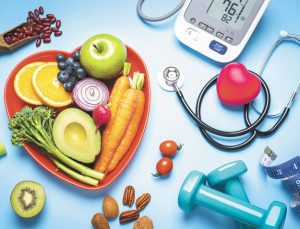 Vascular disease affects millions of Americans, and it’s a leading cause of death. There are multiple comorbid disease states that are interrelated to vascular issues. Although arterial and venous disease can happen to anyone, the most common factors that put you at risk are family history, smoking, being overweight, and a sedentary lifestyle. Atherosclerosis is the primary cause, which is a buildup of plaque, which hardens the arteries and causes life-threatening complications.
Vascular disease affects millions of Americans, and it’s a leading cause of death. There are multiple comorbid disease states that are interrelated to vascular issues. Although arterial and venous disease can happen to anyone, the most common factors that put you at risk are family history, smoking, being overweight, and a sedentary lifestyle. Atherosclerosis is the primary cause, which is a buildup of plaque, which hardens the arteries and causes life-threatening complications.
Complications
• Stroke
• Heart attack
• Amputation
• Poor wound healing
• Pain upon standing or walking
For severe cases, there are important interventional procedures that are necessary; however, cardiovascular disorders are initially treated with lifestyle changes. These include getting blood pressure and cholesterol levels at a normal range through medications. It also includes treating any underlying or comorbid conditions. There are several primary factors that shouldn’t be overlooked. These include, regular exercise and dietary changes. If you smoke, stop now or seek out a smoking cessation program.
The main offenders of cardiovascular issues are being overweight, poor dietary habits, having high blood sugar levels, chemical and toxin overload, and living a sedentary lifestyle.
Too Much Sugar
High blood sugar cardiovascular disease have more in common than most people are aware. In our country nearly 30 million people have diabetes, and a vast majority of our population unknowingly has what’s known as prediabetes, which quickly escalates into the disease within a short amount of time. Sugar causes inflammation in the body and metabolic syndrome. Metabolic syndrome is a condition in which the high insulin and leptin levels are resistant causing high blood pressure, high cholesterol, high triglycerides, and visceral fat to become significant risk factors for heart disease and coronary disorders. When the vessels are circulating high-glucose blood, atherosclerosis occurs at a greater intensity. Atherosclerosis is a build-up of plaque and causes a hardening of the arteries.
Too Much Salt
Excessive salt causes inflammation, which pushes water into the arteries. This causes high blood pressure and makes the heart work extra hard. Too much salt increases your risks of strokes and heart failure, along with other disorders and diseases.
Potassium can help to flush some excess salt out of your body. That is why most salt alternatives have a higher ratio of potassium in the mix. Many foods that contain potassium are bananas, plums, coconuts, avocado, potato and many more. But eating potassium to flush out salt is not a good idea, as it will take an excessive amount, and potassium in excess causes other bodily harm like arrhythmias and muscle weakness.
Keeping your sodium low is one of the major keys to keeping your blood pressure and heart healthy. Eating whole foods is imperative to keeping your sodium levels in check and also to make you healthier, by lowering cholesterol and increasing antioxidants and nutrients from meals.
Improve Your Diet
Shopping the periphery of the grocery store is a great way to avoid all of the processed foods, excessive sugar and salt in the center isles. There are exceptions of course, like frozen fruits and vegetables, and no salt added canned produce as well as dried spices to take the place of your saltshaker. However, for the most part, you should focus your shopping efforts on fresh produce, lean protein like poultry, seafood and eggs and some dairy.
The Mediterranean or the Dash diet are exceptional examples of what foods you should be eating, which provide essential nutrients for the brain’s condition. All three of these diets emphasize eating plenty of vegetables, fruit, healthy fats, whole grains and lean protein (especially cold-water fish) while avoiding excess salt, sugar, simple carbs and saturated fats. Eating this way is thought to prevent cognitive decline by proving the heart, brain and entire body with antioxidants, and the good fats that it needs to function properly. Excessive sugar, simple carbohydrates, processed foods, and chemicals are known to cause inflammation and degeneration.
If you or a loved one has any of the venous symptoms or risk factors discussed above, you must seek medical attention immediately. Making an appointment with a vascular surgeon specializing in venous disease is critical.
Sarasota Vascular Specialists
Sarasota Vascular Specialists have been the leading vascular specialists in the tristate area for over 30 years. Their practice is the only medical practice in the Tri-county area dedicated to the treatment of patients with disorders of the veins and arteries. Unlike most vascular surgical groups, they are also uniquely trained and experienced to offer all forms of diagnosis and therapy including:
• Varicose veins, spider veins, deep venous thrombosis
• Carotid artery surgery and carotid stenting
• Medical management, angioplasty, bypass
• Thoracic and abdominal aortic aneurysms
Sarasota Vascular Specialists has an onsite lab to perform ultrasound and give rapid diagnostics. Their vascular lab can non-invasively diagnose all arterial and venous diseases. Their experienced vascular lab staff includes eight registered vascular technologists.
It’s the first vascular laboratory in Sarasota to be certified by the Intersocietal Commission for the Accreditation of Vascular Laboratories. The lab was also featured as the gold standard facility by ABC Television’s Prime Time when it evaluated vascular labs in Florida. They have state-of-the-art equpment and vascular software.
To schedule your appointment, please call 941-371-6565, or visit veinsandarteries.com to find out more.
Sarasota Vascular Specialists
941-371-6565
veinsandarteries.com
Sarasota
600 N. Cattlemen Road, Sarasota, Florida 34232









